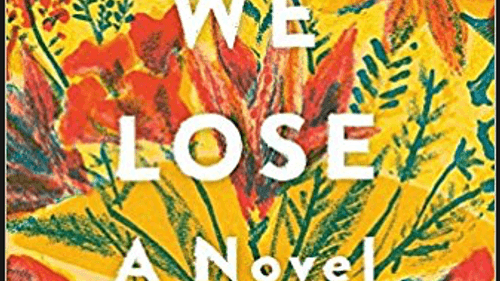Stay in the Loop
BSR publishes on a weekly schedule, with an email newsletter every Wednesday and Thursday morning. There’s no paywall, and subscribing is always free.
What got lost
'What We Lose,' by Zinzi Clemmons

It’s not a spoiler if I tell you that the mother dies.
Especially not when the author herself, Philadelphia-area native Zinzi Clemmons, disclosed this at the start of her Philadelphia Free Library reading. “The reason this is not a spoiler is that this is not a chronological book,” explained Clemmons, back on home turf to promote her debut novel, What We Lose. “The way I wrote this book was to make it based on topical associations… This mimics the way memory works, especially when we go through a traumatic experience. Smells jog memories. Songs jog memories. They take us from one place to the next.”
Unusual structure
In the case of What We Lose, those associations are both broad and loose. The book consists of short vignettes narrated in the voice of Thandi, the daughter (like Clemmons) of a mixed-race South African mother and a black father. Interspersed with Thandi’s memories and musings are blog excerpts, archival photographs, rap lyrics (unattributed, but from the Notorious B.I.G.), passages from Barack Obama’s Dreams from My Father and Nelson Mandela’s Long Walk to Freedom, a 2011 chart of life expectancies in the United States for people of different ethnic groups, and graphs of a geometrical concept called an asymptote.
Some pages contain just a single line: “Sex is kicking death in the ass while singing,” or “I buy a pregnancy test and it says yes.” (Once again, no spoiler here: Thandi vomits at the smell of Chinese takeout in the opening passage.)
“It’s just my style,” Clemmons said, explaining that the novel’s unorthodox structure was influenced by her study of graphic design, visual art, and modern media. “I started from a place of experimentation and freedom… I had a difficult time writing a novel in this form; I had an idea a novel should have a beginning, middle, and end, and I had to really fight against that.”
Mixed metaphors
Sometimes the collaged structure works; a blog post by someone from the Nordic Africa Institute about the perception and reality of crime in post-apartheid South Africa serves to amplify Thandi’s observations about her security-obsessed Johannesburg relatives, whose fancy homes are ringed by razor wire. Later in the book, quotes from a hospice pamphlet defining grief, mourning, and bereavement place the coolly pragmatic terminology at odds with Thandi’s roil of emotions following her mother’s death.
But other times, the juxtapositions are simply perplexing. Why does the novel include several pages (including a photograph) about women who fall in love with serial killers? What are we to make of the abrupt intrusion of a paragraph about a planned Johannesburg high-rise designed by a Ghanaian “celebritect"?
Clemmons, 32, said she intended to write a different book, a novel about the life of a woman with HIV. But her agent encouraged her to build a book around pieces of that manuscript that dealt with loss and mourning — portions that came directly from Clemmons’s experience caring for her mother, who died of cancer in 2012.
What We Lose tackles big issues: not only the wrenching grief of losing a parent but also the stain of apartheid, the hierarchies of skin tone within black communities, the alienation of being mixed race, the politics of abortion, the “privileged” status of cancer compared with other diseases, and the guilt and paranoia that accompany wealth.

Show, don't tell
But Clemmons doesn’t linger long enough on any of these fraught topics. Too many times, the novel raises a provocative question and lets it drop. Even though Thandi’s voice is meant to be intimate, inviting us into her fears, lusts, and ambivalence, the prose sometimes feels crafted at arm’s length.
It’s a foundational precept of writing to “show, not tell.” So when Clemmons writes, “My mother befriended people aggressively. She was extremely opinionated and often abrasive. . . . Her favorite words were four-lettered,” I find myself yearning to hear that salty language and see the mother’s brusque manner rather than be told about them.
Though Clemmons tries to cue readers to the nonlinear timeline by using past tense for flashbacks and present for the novel’s “now,” I was lost at times in the quick cross-cuts, paging backward or forward to figure out where and when in Thandi’s life a particular scene took place.
What We Lose is a first novel, semi-autobiographical, with all of that genre’s bold reach and potential and all of its flaws. Clemmons teaches literature and creative writing at Colburn Conservatory and Occidental College, and clearly has something to say on topics of race and identity, mourning and motherhood. But her peripatetic form doesn’t allow those ideas to resonate deeply enough.
Like the character of Thandi, I wanted more from her world: more sensory details, more subtle probing of the characters’ psychology, more of an effort to lash together the political and personal, the legacy of apartheid, and loss of a mother. I hope Clemmons will persist at her writing table, pushing her way toward a less fractured, more coherent vision in whatever she crafts next.
What, When, Where
What We Lose. By Zinzi Clemmons. Viking, 2017. 224 pages, $14.72, hardcover. Available at Amazon.
Clemmons will read at the Big Blue Marble Bookstore, 551 Carpenter Lane, Philadelphia, Thursday, August 3, 2017. (215) 844-1870 or bigbluemarblebooks.com.
Sign up for our newsletter
All of the week's new articles, all in one place. Sign up for the free weekly BSR newsletters, and don't miss a conversation.

 Anndee Hochman
Anndee Hochman